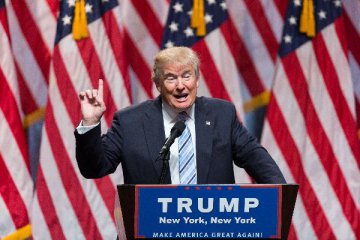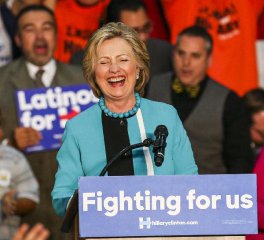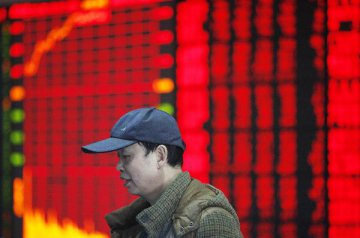
Election polls tighten, risk aversion sentiment heightening
After the final presidential debate, Hillary Clinton and Donald Trump’s approval ratings fluctuate, as the FBI reopened investigation of Hillary Clinton emails. This uncertainty poses pressures on the financial market.
The US presidential campaign has entered the final stage, and the Election Day is November 8. After the final debate, Hillary Clinton held a 10-point lead over Donald Trump. But later on Oct. 28, the FBI unexpectedly announced that it will reopen investigation of Hillary emails. The stock market, exchange market and bond market all fluctuated. The price of gold, which is a risk aversion tool, rose. At the last FOMC meeting before the election, the Federal Reserve (Fed) decided to maintain the monetary policy unchanged for the seventh time during the year, to avoid causing any market turbulence. Despite the economic data of the US is optimistic, the market remains under pressure due to the uncertainty of election result. The dollar index had surged since October and hit the high in nine months, but after the FBI announced restarting investigation of Hillary Clinton emails, the dollar tumbled. Fed’s decision of not increasing interest rate in November send the dollar lower from 98.92 on Oct. 27 to 96.94 at the end of last week.
The uncertainty of US election also drives up anxiety in the stock market. Dow Jones posted 18,199.47 points on Oct. 26, and declined continuously in the following few trading days to stand at 17,889.86 points on Nov. 4, down 1.7 percent. In the same period, the S&P 500 index has decreased by 2.3 percent, the lowest reading since Brexit. The nine consecutive days’ decline is also the longest since 1980. Meanwhile, the Nasdaq index was down by 3.6 percent. Up till Nov. 4, the CBOT Volatility Index (VIX) had risen for nine consecutive trading days, and it has hit the high since Brexit in June to post 22.51. The VIX reportedly have climbed 65 percent over the past two weeks.
Though US stocks usually surge before presidential elections, this time concerns over the election result on Nov. 8 leave the market completely clueless, and even the optimistic nonfarm payroll employment data released on Nov. 4 failed to shore up the sentiment. It is reported that the performance of the US stock market before the election is closely related to the election result since 1928. Specifically, when the stock market rallies, it means that there will be high probability for the ruling party to continue to win. While stock market tumbles signify greater chance for the ruling party to lose. This rule has been testified in most elections except 1956, 1968 and 1980, representing a precision rate of 86.4 percent.
The tightening of the election polls boosted risk aversion sentiment on the market. Gold, which could act as a risk aversion tool, has been favored by the market. Concerns over the election result also eliminate the impact of rates hike expectation supported by sound employment report. Capital data of funds tracked by Bank of America Merrill Lynch shows that government bond funds have attracted 300 million yuan capital inflow, the first single-week capital inflow in 17 weeks. The price of US Treasury bond surged again, covering the partial loss from massive sell-offs in October. CNBC pointed out in its report that the stock market may experience big sell-off in the near term, and inflation pressure will push up bond yield. Uncertainty over the prospects will benefit risk aversion assets such as US Treasury bond and precious metals.
The gold surged by 2.9 percent at 1,304.66 US dollars per ounce at the end of last week since the FBI reopened investigation of Hillary Clinton emails.
Polls on Nov. 3 show that if the election is held immediately, Clinton may hold a narrow lead over Trump with 273:265. But if Trump on this basis can win the four votes of the swing state New Hampshire, the two will finally break even with 269:269. Supposing the two candidates are both unsatisfactory to some of the voters, MacMullin, the third party independent candidate, is likely to win the six votes in his hometown Utah. In this circumstance, both Donald Trump and Hillary Clinton cannot get 270 votes. The election as a result will be extended indefinitely, and panic on the market will continue to upsurge, resulting in plunges of US stocks.
FBI's Clinton probe could throw election off course, Citi says, adding that it may exert far-reaching influence. Though Hillary Clinton has a 75 percent chance of winning the election, the latest development may alter to her disadvantage, further dampening voters’ confidence on the democrat.
“The US presidential election is the biggest black swan in the market so far,” says chief researcher of Julius Baer, a Swiss private banking group. “The best situation is Hillary Clinton winning the election, and the worst is nobody wins.”
Financial Times says that investors hope Hillary Clinton to win because that means the uncertainty of the market will reduce, but FBI’s probe decreases her odds of winning.
Morgan Stanley believes that the market has already prepared to face the worst election result. Before the Election Day, the selling pressure of dollar will continue, unless polls again show that Hillary has greater odds to win the election.
Analysis believes that no matter who wins the presidential election, large volatility is unavoidable in the US market afterwards. Many traders hold that if Trump wins, the VIX will climb since the market believes that he will bring uncertainties to both domestic policies in the U.S. and global affairs. But if Trump’s Democratic rival Hillary wins the election, the VIX is unlikely to rapidly decline to the level before presidential election. A trader named Najarian remarked that the VIX will further climb in the short run. Speculation about investigation and potential criminal charge over Hillary and her trusted followers will not diminish rapidly, so volatility might decline but will not disappear.
Johansson, a professor with George Washington University Law School, remarked that though pardon might make Hillary exempted from punishment, but it can’t make her freed from congressional investigation and even impeachment. The pardon will cast a shadow on Hillary’s tenure as US president.
Brookings Institution expects that if Hillary wins the election, the S&P500 Index will move up by 12 percent, market volatility will move down by 15-30 percent, the yield rates of US government bonds will be increased by 25 base points, and the price of crude per barrel will hike by 4 US dollars. While if Trump wins, the stock markets of countries in America, Europe and Asia will experience a decline of 10-15 percent, price of crude oil will drop by 4 US dollars per barrel, Mexican peso will suffer a decline of 25 percent, and market volatility will be greatly worsened.
News was quite mixed on Nov. 6. Latest poll from CNN shows that Hillary has dropped below 270 electoral votes for the first time in CNN's electoral map. But according to Washington Post-ABC poll on Nov. 6, Clinton leads Trump by 5 percent in polls. The poll lasted from Nov.1 to Nov.4. It is highly possible that volatility will continue in the US market before the election.
Translated by Adam and Jennifer





















Latest comments